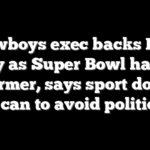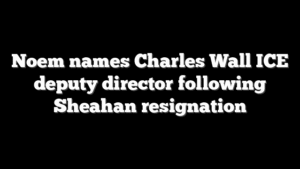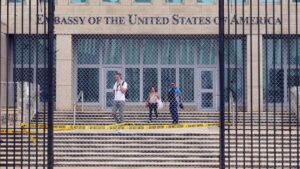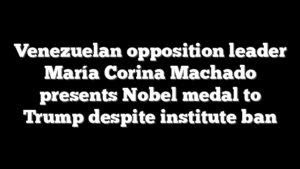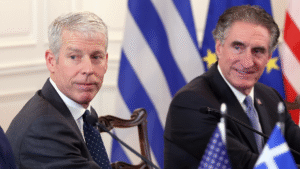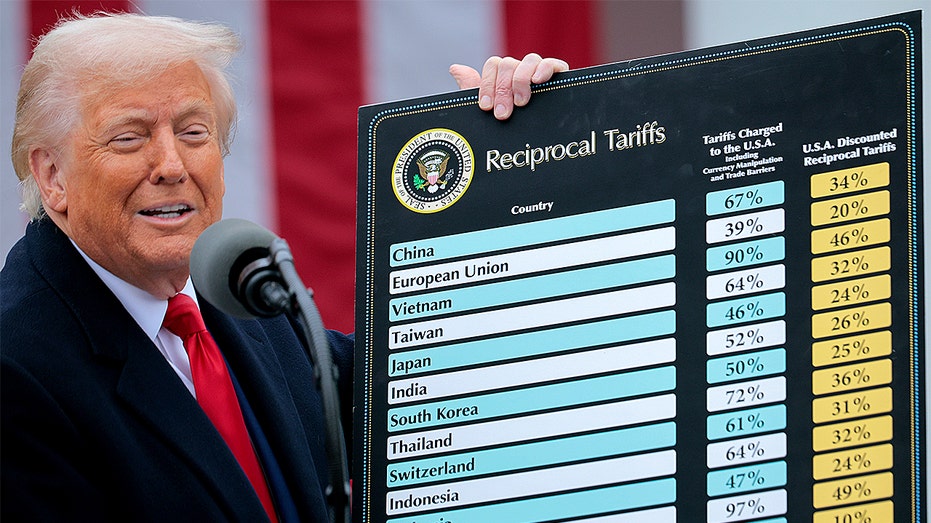
Trump’s signature tariffs hang on key question about Congress’ power before Supreme Court
The Supreme Court is weighing whether to expand presidential power in a case over Donald Trump’s global tariffs, but key constitutional issues could doom the president’s argument.
The high court raised separation of powers concerns during recent oral arguments about the absence of Congress’ role in Trump’s sweeping trade plan, which the president has said is critical to foreign policy and national security and a matter of “life or death” for the country.
Justices across the ideological spectrum peppered Solicitor General John Sauer, the lawyer arguing on behalf of Trump, with questions about whether the president overstepped his authority. They framed their inquiries at times around two legal principles, known as the major questions and non-delegation doctrines, and scrutinized the text of the emergency law Trump invoked to enact the tariffs.
Justice Clarence Thomas set the stage for the nearly three-hour arguments. In the first question of the day, Thomas, an appointee of President George H.W. Bush, asked Sauer to “spend a few minutes on why exactly the major questions doctrine doesn’t apply to the president in this case.”
BARRETT AND SOTOMAYOR TAG-TEAM TRUMP LAWYER ON TARIFF POWERS
Under the principle, courts look to make sure the executive branch has not used a vaguely written law to carry out an act of major national significance, like worldwide tariffs.
Sauer responded that the tariffs case, which involved foreign trade deals, was a “particularly poor fit” to apply the major questions doctrine because courts should give broader power to the president on foreign policy matters.
Brent Skorup, a legal fellow at the CATO Institute, which has sided against Trump in the case, told Fox News Digital he has seen two trends emerge from the Supreme Court. One is a long-term trend where the high court is highly deferential to the president on overseas matters, but the other, he said, was a more recent use of the major questions doctrine.
Courts have increasingly used the doctrine to demand clear statutory permission for blockbuster policies, striking down agency actions in West Virginia v. EPA and Biden v. Nebraska. Several justices asked whether that same rule applies when the president, rather than an agency, claims sweeping tariff power under the statute Trump used, which never mentions the word “tariffs.”
“It’s not clear which trend will play out,” Skorup said. “My hunch is that most, and this was confirmed at oral arguments, most justices are probably leaning towards favoring the importers and these more recent doctrinal trends will prevail.” He added he was encouraged by Chief Justice Roberts pressing Sauer about the matter.
“He seemed to think there’s a major questions problem here,” Skorup said.
TRUMP ASKS SUPREME COURT FOR URGENT RULING ON TARIFF POWERS AS ‘STAKES COULD NOT BE HIGHER’
Trump has been on a rampage this week, emphasizing the perceived stakes of the case, a sign that he could be bracing for an unfavorable outcome.
Trump claimed that if the tariffs are deemed illegal, the potential refund process could exceed $3 trillion. He said the justices were given “wrong numbers” about repayment costs.
“It would not be possible to ever make up for that kind of ‘drubbing,’” Trump wrote on social media. “That would truly become an insurmountable National Security Event, and devastating to the future of our Country – Possibly non-sustainable!”
Trump used the 1977 International Emergency Economic Powers Act to sidestep Congress’ role in approving taxes and tariffs, saying the opioid epidemic and trade deficit amounted to a national emergency and justified a host of tariffs on imports from major trading partners from China and India to Canada and Mexico. Trump has touted the billions in revenue collected by the government and said it will be used to pay $2,000 to lower-income families and pay off some of the national debt.
TRUMP’S OWN SCOTUS PICKS COULD WIND UP HURTING HIM ON TARIFFS
But the justices repeatedly questioned how Trump could justify bypassing Congress, especially when IEEPA was not clear on the matter. Justices Amy Coney Barrett and Sonia Sotomayor, Trump and Obama appointees, respectively, grilled Sauer about how IEEPA did not spell out that the president could unilaterally enact tariffs, even if it did give the president the power to “regulate imports.”
The Supreme Court could also factor the non-delegation doctrine into its finding, either in an avoidant or direct way. The key question is, even if IEEPA could be read to allow tariffs, would that reading hand the president Congress’s core tariff authority without a limiting principle?
Justice Neil Gorsuch, a Trump appointee, seemed particularly interested in the issue, asking Sauer if Congress could “delegate to the president the power to regulate commerce with foreign nations as he sees fit.”
If the Supreme Court were to take the avoidant route, according to Ilan Wurman, a law professor at the University of Minnesota, it could interpret IEEPA narrowly to avoid a possible finding that Congress improperly passed off its tariff authority to the president. Wurman told Fox News Digital that would be easier than directly concluding that Congress gave up its constitutional power to another branch of government.
But, Wurman said, “on the other hand, every century or so the Supreme Court should strike something down under the non-delegation doctrine. Give it a little life here and there, right?”
A decision is expected by late June.
Latest Political News on Fox News


